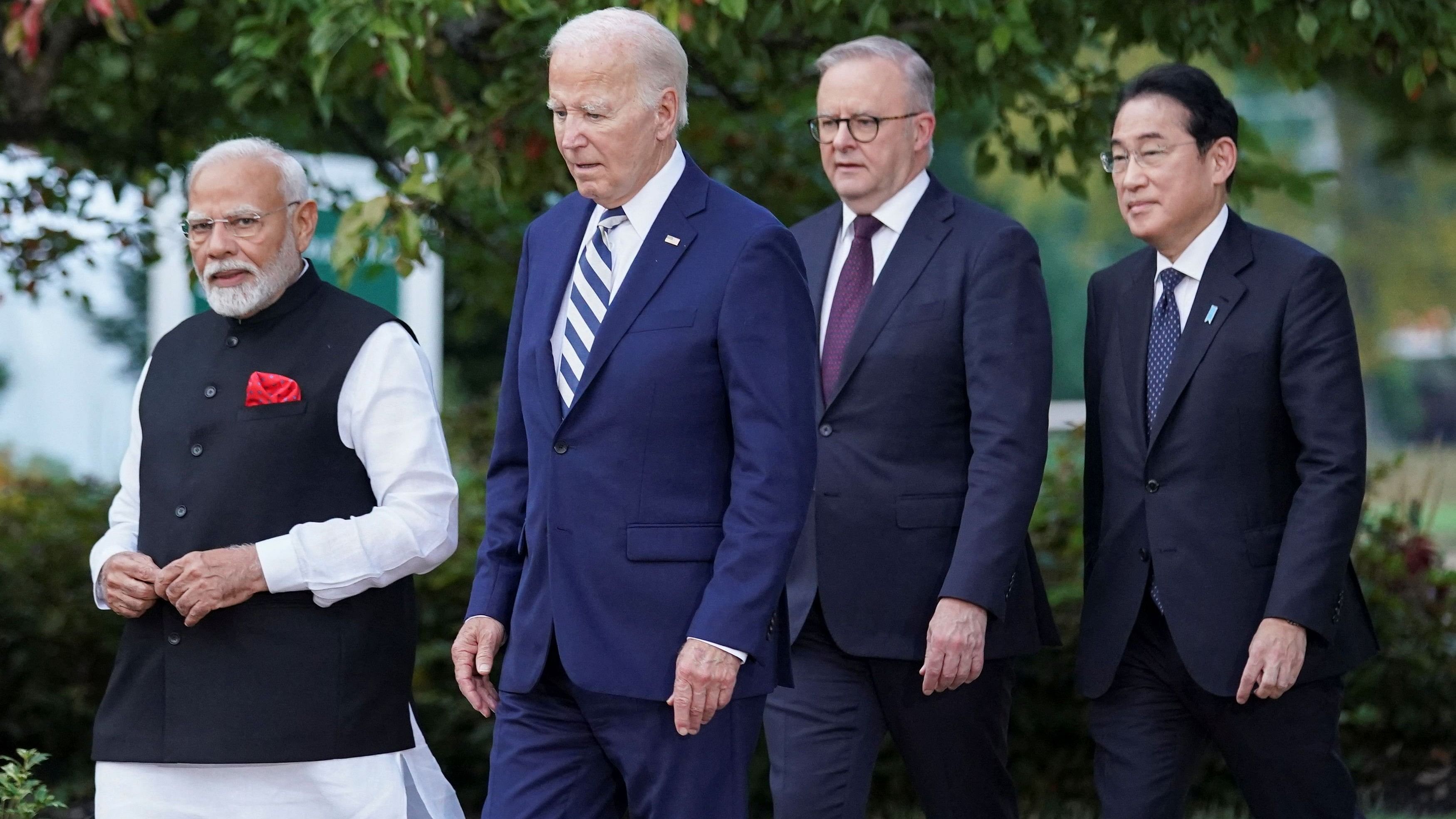
US President Joe Biden, Japan's Prime Minister Fumio Kishida, Australia's Prime Minister Anthony Albanese and India's Prime Minister Narendra Modi arrive for a Cancer Moonshot announcement at the Quad leaders summit in Claymont, Delaware, US, September 21, 2024.
Credit: Reuters Photo
New Delhi: India has joined Japan, Australia, and the United States to send a strong message to China, expressing serious concerns over “coercive and intimidating maneuvers” in the South China Sea and agreed that the coast guards of the four nations would launch a joint mission in the Indo-Pacific region in 2025.
The Quad – a coalition of India, Japan, Australia, and the US – agreed to help leverage electro-optical data and advanced analytic software to sharpen the maritime domain awareness for partner nations in the Indo-Pacific region and to help keep watch on their territorial waters. The coalition also launched an Indo-Pacific Logistics Network pilot project to pursue shared airlift capacity among the four nations and leverage collective logistics strengths to support civilian response to natural disasters more rapidly and efficiently across the region.
“Free, open, inclusive, and prosperous Indo-Pacific is our shared priority and shared commitment.” Prime Minister Narendra Modi said as he joined his Japanese and Australian counterparts, Fumio Kishida and Anthony Albanese, as well as US President Joe Biden for the fourth in-person summit of the Quad, which had been conceived in 2007 and revived in 2017 to counter the hegemonic aspirations of China. “We are not against anyone. We all support a rules-based international order, respect for sovereignty and territorial integrity, and the peaceful resolution of all issues… Our message is unequivocal: Quad is here to stay, to assist, to partner, and to complement.”
New Delhi in the past resisted the US pressure to turn the Quad into a NATO-like security alliance for the Indo-Pacific and rather insisted on pursuing a benign agenda to counter China’s bid to spread its military, political, and economic influence in the Indo-Pacific.
The summit the US president hosted at his hometown Wilmington in Delaware however saw India giving its nod to the launch of the first-ever Quad-at-Sea Ship Observer Mission in the Indo-Pacific in 2025. The personnel of the Japan Coast Guard, Australian Border Force, and Indian Coast Guard will spend time on board a US Coast Guard vessel operating in the Indo-Pacific. The Quad leaders also indicated that the four nations would continue with similar missions in the Indo-Pacific in the future – a move that is likely to raise hackles in Beijing.
Modi avoided directly naming China. The joint statement issued by the leaders of the four maritime democracies after the summit also had no mention of the communist country even as it sent out a tacit but tough message to Beijing.
“We are seriously concerned about the situation in the East and South China Seas. We continue to express our serious concern about the militarization of disputed features, and coercive and intimidating maneuvers in the South China Sea,” the four leaders said in the “Wilmington Declaration” issued after the summit.
They subtly referred to the recent incidents involving the ships of China and the Philippines in the South China Sea and condemned the “dangerous use of Coast Guard and maritime militia vessels, including the increasing use of dangerous maneuvers”. They also opposed “efforts to disrupt offshore resource exploitation activities” of other countries in the Indo-Pacific region.
Biden, however, was caught on a hot mic at the beginning of the summit, telling Modi, Albanese, and Kishida that China continued to "behave aggressively" in the South China Sea, the East China Sea, and the Taiwan Strait.
The Quad also announced a new regional Maritime Initiative for Training in the Indo-Pacific (MAITRI) to enable partner nations in the region to maximize tools provided through Indo-Pacific Maritime Domain Awareness, which had been launched in 2022, to monitor and secure their waters, enforce their laws, and deter unlawful behaviour. India will host the inaugural MAITRI workshop in 2025.
Modi, Biden, Albanese, and Kishida also announced the “Quad Ports of the Future Partnership”, which will harness the collective expertise of the four nations to support sustainable and resilient port infrastructure development across the Indo-Pacific.
It will set the stage for sharing best practices to ensure that ports can maintain an acceptable level of service and infrastructure to ships, cargoes, and other customers in the face of disruptions, like pandemics, natural disasters, and cyber-attacks or terrorist strikes.
